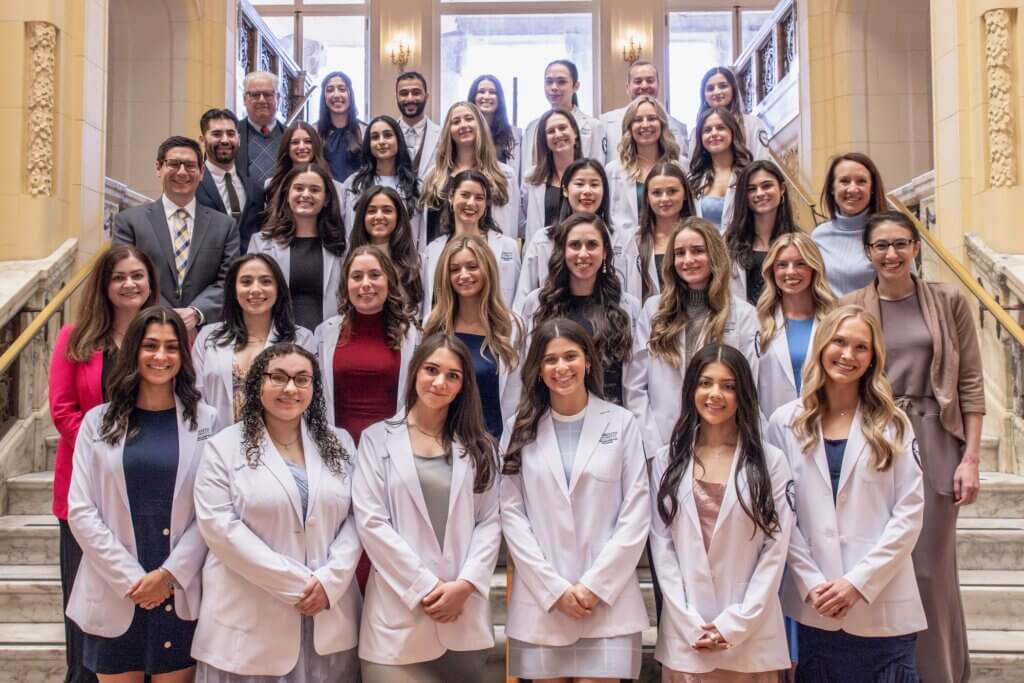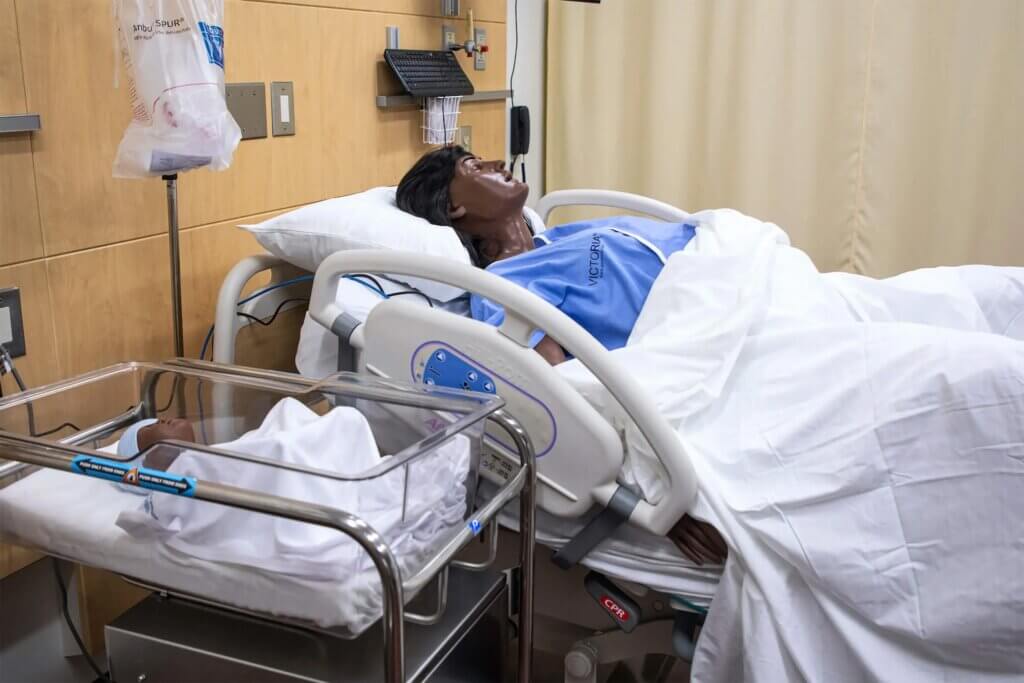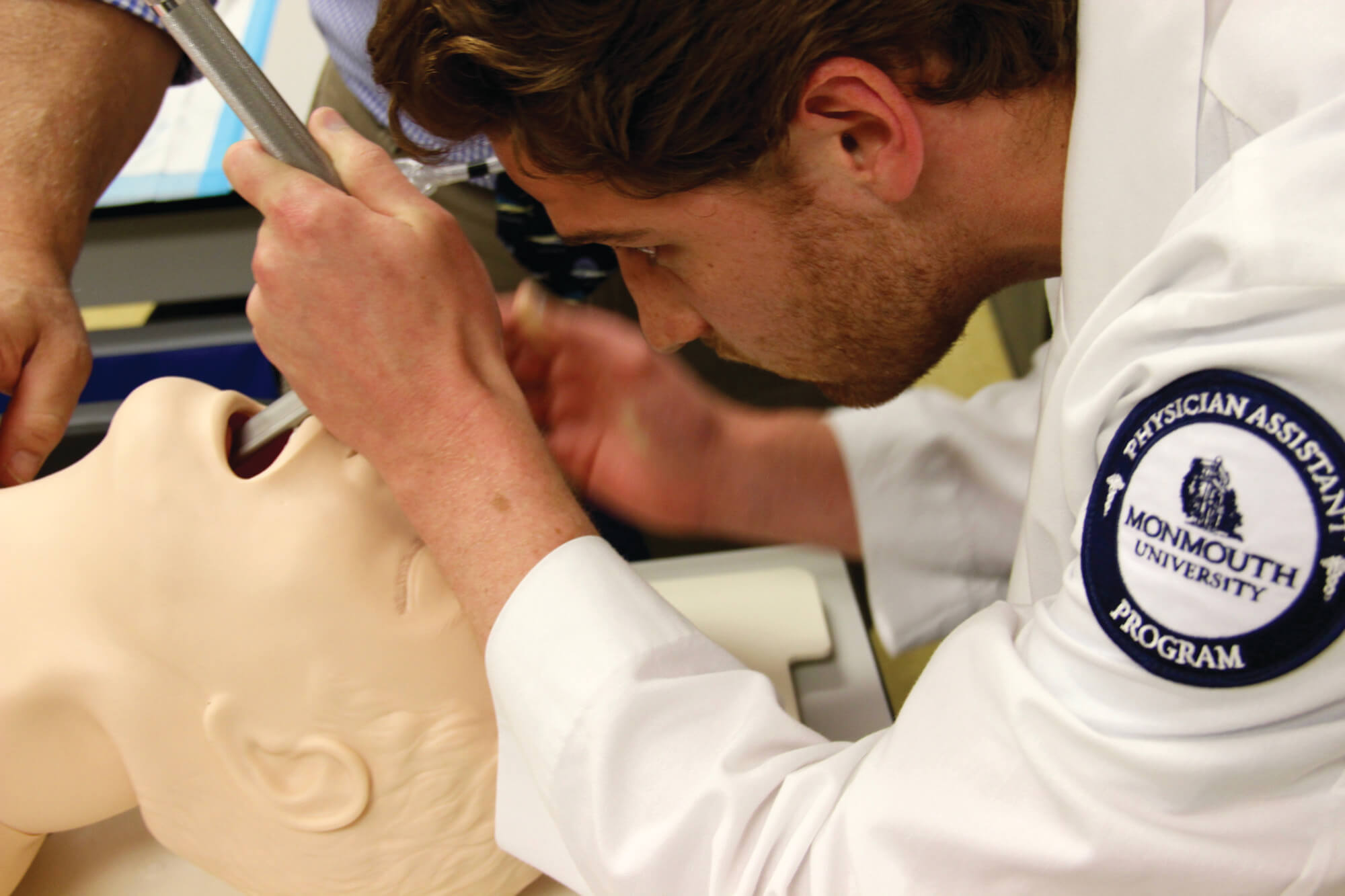Jump To
Program Details
About
- Master of Science in Physician Assistant (MS)
- On campus
- 95 Credits
- 3 Years, Full-time
Application Deadlines
Fall
October 1
We recommend that applications and materials are submitted via CASPA by September 1 in order to be verified and complete by the October 1 deadline (fall-start only).
Get Started
PA Program Overview
Physician assistants, commonly referred to as PAs, play a critical role in today’s healthcare landscape. These skilled professionals serve patients as part of a broader healthcare team in a variety of settings from hospitals and urgent care centers to mental health facilities and private practice.
Monmouth University prepares you to enter this exciting, rewarding, and in-demand profession. You’ll build a solid foundation through didactic (theory-based) classes and hands-on learning experiences and simulations in state-of-the-art laboratories. You’ll then spend four semesters immersed in a variety of healthcare settings through a rotation of core clerkships and selective clerkships. Students can choose two selective clinical sites such as cardiology, dermatology, plastic surgery, trauma surgery etc. Through it all, you’ll be supported by compassionate faculty and staff members.
Our West Long Branch, New Jersey, location puts you within reach of renowned hospitals and healthcare facilities for both clinical experience sites and future careers. In Monmouth County alone you’ll find Hackensack Meridian Health, RWJ Barnabas Health, and CentraState Healthcare System. We also have established relationships with additional facilities in New York.
Program Vision and Mission Statements
Our vision is to become a premier PA program offering our students extensive, high quality educational experiences that will allow them to become empathic practitioners and leaders in their community.
The mission of Monmouth University’s physician assistant program is to educate physician assistants to provide compassionate, patient-centered, quality healthcare in a variety of settings. Program graduates will possess clinical skills to serve a diverse patient population and have the ability to advance the profession through leadership and research.
Learning Outcomes
Technical Standards
The technical standards have been developed in consideration of the demands of didactic and clinical training in graduate health sciences and clinical practice as a clinical clerkship student. Along with other program prerequisites and requirements, all candidates and students must be able to independently, with or without reasonable accommodation, meet our Program specific technical standards. Once matriculated, all students must continue to meet these standards throughout the entirety of their program. Failure to meet all technical standards at any time in the program may preclude participation in the program and program activities, resulting in dismissal or deceleration/delay of graduation from the program.
The technical standards are organized in the following categories:
- Observation
- Communication
- Sensory and Motor
- Intellectual-Conceptual, Integrative and Quantitative Abilities
- Behavioral and Social Attributes
Observation
- Students must have the appropriate skills of observation along with the use other senses (hearing, smell, touch, spatial relationships) in order to participate in classroom, laboratory, and clinical settings.
- Students must be able to observe and interpret accurately a patient’s verbal and nonverbal signs.
- Students must be able to observe the patient up close and at a distance.
Communication
- Students must possess the ability to effectively communicate in oral and written English. The individual must be able to speak, to hear, and to observe patients in order to elicit information. In addition, students must be able to respond in written and oral exams, interact with peers and instructors during small group discussions, and when needed, write legibly in required documents.
- Students must be able to converse with patients with a sense of compassion and empathy. They must be able to communicate information about a patient’s condition effectively and succinctly to other members of the health care team.
Sensory and Motor
- Students must have adequate gross and fine motor function and coordination along with the use of their senses in order to elicit information from their patients. Many sensory skills are used during physical examination maneuvers of inspection, palpation, percussion, auscultation, and other special techniques.
- These motor skills are required to perform an adequate examination and patient evaluation as well as using diagnostic instruments.
- The performance of venipuncture, intravenous catheter placement, suturing and other diagnostic procedures are other examples needing motor function.
- Sufficient physical stamina is required such that students can sit for long periods of time during didactic lectures and be able to move through physical environments such as clinics, hospitals, and classroom buildings. Students must have the ability to respond quickly to emergent clinical situations and be able to carry out functions that include bending, lifting, carrying, and running.
Intellectual, Conceptual, Integrated, and Quantitative Abilities
- Required skills for PA practice include comprehension, measurement, calculation, reasoning, analysis, and synthesis. Students need to able to independently interpret medical histories, identify significant finding from the physical examination, and distinguish normal from abnormal laboratory findings.
- Students must possess these skills in order to successfully meet the demands of didactic and clinical learning.
- It is essential that students have the ability to integrate new knowledge into formulating diagnoses and plans when working with fellow students, instructors, and preceptors. Assimilation of new knowledge should additionally occur through reading the medical literature. Students must recognize their own limitations in knowledge and be able to communicate this to others.
Behavioral and Social Attributes
- Students must possess the intellectual and emotional fortitude to promptly carry out and complete all assignments and to exercise good judgment. Students must work supportively with their peers in order to maintain a professional atmosphere that encourages active, cooperative learning. It is required that students be emotionally stable in order to withstand stress associated with intensive learning settings and uncertainties associated with the didactic and clinical environments.
- During the admission process and throughout the educational experience, students will be assessed for the qualities of integrity, ethical standards, motivation, and compassion and concern for others.
- Students are expected to accept constructive criticism from instructors, clinical preceptors, and patients.
- They must also have the interpersonal skills to interact cooperatively with faculty, staff, students, patients, and members of the health care team.
Graduate Competencies
Program learning outcomes represent the knowledge, interpersonal, clinical and technical skills, professional behaviors, and clinical reasoning and problem-solving abilities that we believe are necessary for clinical practice. To ensure the outcomes have been achieved, students will undergo several evaluation methods throughout the curriculum and prior to graduation to confirm that they are competent in the areas listed below. Evaluation methods include written examinations, oral examinations, practical examinations, objective structured clinical examinations (OSCEs), professionalism assessments, and faculty and clinical preceptor evaluations.
In developing our learning outcomes, we incorporated information from a variety of sources including the Accreditation Review Commission on Education for the Physician Assistant (ARC-PA) and the nationally recognized Competencies for the PA Profession that was originally developed and adopted 2005 and revised and readopted in 2012 by the American Association of PAs (AAPA), ARC-PA, National Commission on Certification of PAs (NCCPA), and the PA Education Association (PAEA). Additional sources included our faculty’s knowledge and input from our medical director, clinical preceptors and advisory board members. Although our learning outcomes carry the same headings as the national competencies for practicing PAs, these have been honed and adapted to represent skills acquired during the educational process, geared towards entry level practice, and made specific to the Program. Additionally, the program has developed benchmarks for each learning outcome to assess the program’s effectiveness in meeting graduate competencies. Benchmarks and outcome data are posted on the MS-PA program website.
The MS-PA program has the following learning outcomes:
- Medical Knowledge
- Synthesize and apply fundamental knowledge in clinical sciences to patient presentations when developing a differential diagnosis, patient management plan, health maintenance and disease prevention.
- Obtain, investigate and critically analyze appropriate patient history, physical, and diagnostic findings in order to derive a definite diagnosis.
- Understand and apply evidence-based guidelines to the care of the patient when recommending patient management plans and screening methods.
- Demonstrate familiarity with signs, symptoms, diagnosis and management of common conditions seen in the patient, understanding associated etiologies, risk factors, underlying pathologic process, epidemiology, diagnostic criteria and treatment modalities.
- Determine appropriate management strategies for patients with chronic conditions, and those needing short and long-term rehabilitation, psychiatric intervention, safety measures against abuse and violence or end of life care.
- Interpersonal & Communication Skills
- Maintain ethical and respectful communication skills including verbal, nonverbal, written, and electronic documentation when eliciting and providing information to the patient, patient family, physicians, and health care staff.
- Maintain ethical, respectful, and appropriate relationships with patients, patient family, physicians, and other health care staff.
- Demonstrate the ability to maintain accurate patient records and documentation as well as provide accurate, clear, logical, and efficient oral case presentations.
- Maintain composure and emotional stability and demonstrate adaptability and flexibility when working effectively as a member of a health care team to provide care to the patient.
- Patient Care
- Perform pertinent and accurate history, physical, assessment, and plan demonstrating patient centered care and use of age-appropriate evidence-based guidelines and recommendations.
- Develop and implement patient care plans identifying recommended age-appropriate screenings across the lifespan to promote disease prevention and health maintenance.
- Perform medical and surgical skills and procedures commonly utilized in the patient population.
- Display empathetic behavior with a diverse patient population while providing sound patient education and recommendations.
- Professionalism
- Demonstrate adherence with legal regulations identifying personal limitations and commitment to continuing medical education and professional growth.
- Form respectful professional relationships with patients, patient family, physician supervisors, and other health care staff demonstrating sensitivity to culture, age, gender, and sexual identity.
- Demonstrate initiative and commitment by providing evidence of professional.
- Practice-based Learning & Improvement
- Apply critical analysis of study designs and statistical methods to the appraisal of clinical studies and medical literature to accurately integrate evidence related to diagnostic criteria and therapeutic effectiveness for the care of the patient.
- Demonstrate appropriate response to feedback and criticism, providing evidence of self- motivation by rectifying gaps in medical knowledge.
- Utilize common resources, technology, electronic medical records, databases, and evidence- based guidelines to establish current and best patient care practices.
- Systems-based Practice
- Demonstrate an awareness of financial limitations and rising healthcare costs to provide patient centered care that is cost effective but doesn’t compromise quality.
- Advocate for systems-based factors that serve as a barrier to patient care by identifying resources and support to improve patient compliance and outcomes.
- Develop awareness to concepts of health population and support the socioeconomic status, geographic location, culture, race, age, sexual identity, and disability status of the patient.
- Identify and respond to the situations, circumstances, and actions that contribute to medical errors to improve patient care.
Career Outcomes: Physician Assistant Jobs
Physician assistants are in high demand. According to the U.S. Bureau of Labor Statistics, the field is expected to grow 28% through 2033, which is much faster than the average occupation. U.S. News & World Report also ranked physician assistant No. 3 on its 100 Best Jobs in America list for 2025. This field also pays well. The 2023 national average physician assistant salary was $130,020; the average salary in New Jersey was $148,350.
Program Outcomes
Physician Assistant National Certifying Examination Exam Performance Summary Report
- Program Name: Monmouth University
- Program Number: 6031
- Test Taker Status: All Test Takers
Definitions of the report headings are provided at the end of the report. All information is current as of the date the report was generated unless otherwise specified.
| Class | Class Graduation Year | Group | Number of Candidates Who Took PANCE | Number of Exam Attempts | Number of Exams Passed | Program Exam Pass Rate | National Exam Pass Rate for the Class Graduation Year | % of Candidates Who Ultimately Passed PANCE |
|---|---|---|---|---|---|---|---|---|
| Class of 2021 | 2021 | All Takers | 30 | 31 | 29 | 94% | 91% | 97% |
| First Time Takers | 30 | 30 | 28 | 93% | 93% | 97% | ||
| Class of 2022 | 2022 | All Takers | 30 | 37 | 30 | 81% | 89% | 100% |
| First Time Takers | 30 | 30 | 26 | 87% | 92% | 100% | ||
| Class of 2023 | 2023 | All Takers | 27 | 30 | 27 | 90% | 89% | 100% |
| First Time Takers | 27 | 27 | 26 | 96% | 92% | 100% | ||
| Class of 2024 | 2024 | All Takers | 29 | 33 | 29 | 88% | 90% | 100% |
| First Time Takers | 29 | 29 | 25 | 86% | 93% | 100% | ||
| Class of 2025 | 2025 | All Takers | 30 | 31 | 30 | 97% | 90% | 100% |
| First Time Takers | 30 | 30 | 29 | 97% | 93% | 100% |
| Definitions of Report Headings | |
|---|---|
| Class | Class nomenclature and the individuals included in each class are determined by PA programs when assigning students to a particular class. |
| Class Graduation Year | Graduation year for the majority of the individuals in the specific class based on the confirmed graduation date provided by the PA program. |
| Group | All takers include first time takers as well as those individuals in the class who repeated the exam one or more times. First time takers are those candidates who took PANCE for the first time. |
| Number of Candidates Who Took PANCE | Number of individuals from the class who have taken PANCE. Fist time takers are included in the all takers group. |
| Number of Exam Attempts | Total number of exams administered, including multiple exam attempts for an individual candidate in the all takers group. (This is a count of exams administered, not a count of individual candidates.) |
| Number of Exams Passed | Number of exams administered that resulted in a passing score. |
| Program Exam Pass Rate | Percent of exams that were passed as compared to the number of exams that were administered to the class, including multiple exams taken by individual candidates. |
| National Exam Pass Rate for the Class Graduation Year | Percent of exams that were passed at the national level as compared to the number of exams that were administered. The calculation is based on the total number of exams administered and passed, not the number of individual candidates. The reporting period is based on the calendar year corresponding with the class graduation year and will only be provided after the end of the current calendar year |
| % of Candidates in the Class Who Ultimately Passed PANCE | Percent of candidates from the specified class that have passed PANCE as of the date the report was generated, regardless of the number of attempts or the calendar year in which PANCE was passed. |
Five Year First-Time Test Taker Average: 92.4%
Physician Assistant National Certifying Examination Five Year First Time Taker Summary Report
Monmouth University MSPA Program Attrition Table for Three Most Recently Graduated Cohorts
| Item | Graduated Classes | ||
|---|---|---|---|
| Class of 2023 | Class of 2024 | Class of 2025 | |
| Maximum entering class size (as approved by ARC-PA) | 30 | 30 | 30 |
| Entering class size | 30 | 30 | 30 |
| Graduates | 27 | 29 | 30 |
| *Attrition rate | 10% | 3.3% | 0% |
| **Graduation Rate | 90% | 96% | 100% |
*Attrition rate calculation: Number of students who attritted from cohort divided by the entering class size.
**Graduation rate: Number of cohort graduates divided by the entering class size.
Monmouth University MSPA Program Admission Data
| Average GPA, GRE Percentiles and Patient Hours per Cohort | ||||||
|---|---|---|---|---|---|---|
| Cohort | Cum. GPA | Pre-Req GPA | GRE Analytical % | GRE Quantitative % | GRE Verbal % | Patient Care Hours |
| Class of 2020 | 3.5 | 3.5 | 63.3 | 45.1 | 55.3 | 1,511 |
| Class of 2021 | 3.6 | 3.6 | 69.1 | 45.5 | 59.1 | 1,464 |
| Class of 2022 | 3.5 | 3.5 | 54.8 | 40.3 | 45.7 | 1,484 |
| Class of 2023 | 3.4 | 3.6 | 54.6 | 36.2 | 44 | 2,002 |
| Class of 2024 | 3.4 | 3.5 | 65.1 | 40.8 | 51.8 | 2,767 |
| Class of 2025 | 3.5 | 3.6 | 55 | 51 | 61 | 2,504 |
| Class of 2026 | 3.6 | 3.59 | 63.2 | 42.3 | 49.1 | 2,100 |
| Class of 2027 | 3.59 | 3.5 | 51 | 49 | 55 | 2,504 |
| Class of 2028 | 3.56 | 3.57 | 52.4 | 40.4 | 69.8 | 2,400 |
Program Goals & Outcomes
Goal #1: The Monmouth University PA Program Aims to Have an Annual NCCPA Physician Assistant National Certifying Examination (PANCE) Pass Rate Close to Or Above National Average
Program Benchmark: Achieve a PANCE first-time test-taker pass rate at or above the national average.
Program Outcome: The program has met or exceeded national PANCE first time test taker pass rates for 3 of the last 5 graduating classes. The overall 5-year first-time test taker average is 92%. The most recent graduating Class of 2025 had a first-time test taker PANCE pass rate of 97%, national data will be made available in January 2026.
Goal #2: The Monmouth University PA Program Will Have Graduates Securing Employment as PA-Cs in a Variety of Medical or Surgical Specialties
Program Benchmark: 100% of graduates will secure employment as certified PAs in a variety of areas including primary care medicine, specialty medicine, and surgery.
Program Outcome: 100% of graduates in the Class of 2022, 2023 and 2024 have requested verification of school attendance by prospective employers. Employers requesting verification include a variety of settings and specialties including cardiology, dermatology, emergency medicine, orthopedics, family medicine, interventional radiology, internal medicine and intensivist medicine, pediatric medicine, psychiatry, surgery and surgical subspecialties, and urgent care. The employment data for the class of 2025 will be updated in January 2026.
Number of Graduates Working in the Field, Class of 2023 (N=27)
| Specialty | Graduates |
|---|---|
| Cardiology | 2 |
| Critical Care | 1 |
| Dermatology | 3 |
| Emergency Medicine | 2 |
| Family Medicine | 2 |
| Internal Medicine | 3 |
| Orthopedics | 4 |
| Urgent Care | 4 |
| Surgery | 4 |
| Oncology | 1 |
| Women’s Health | 1 |
Number of Graduates Working in the Field, Class of 2024 (N=29)
| Specialty | Graduates |
|---|---|
| Cardiology | 2 |
| Critical Care | 2 |
| Dermatology | 4 |
| Emergency Medicine | 5 |
| Family Medicine | 2 |
| Internal Medicine | 2 |
| Orthopedics | 4 |
| Urology | 2 |
| Surgery | 6 |
Goal #3: The MUPA Program Aims to Develop Highly Competent Healthcare Providers Who Exhibit Professionalism, Integrity and Ethical Practice
Program Benchmark: The program includes specific training in ethics and professional practice throughout the curriculum. All students should meet this program competency at the conclusion of their training.
Program Outcome: MUPA students are continuously mentored and evaluated for professionalism in each course throughout the didactic and clinical portions of the program. For the most recent graduating cohort, ethical practice and professionalism were evaluated during their summative assessment prior to graduation with 100% of students meeting the competency. On exit survey data from the Class of 2025, students were queried for the program’s culture of encouragement of professionalism, integrity, and high ethical standards with an overall score of 3.95/5, exceeding the program’s set benchmark of 3.5/5.
Goal #4: Monmouth University MSPA Program Students Will Receive Training in Medical Research with a Focus on Evidence Based Medicine
Program Benchmark: 100% of students receive training in medical research with a focus on evidence-based medicine.
Program Outcome: All students are required to successfully complete two semesters of research coursework resulting in research papers and poster presentations. For the Class of 2024, all students developed a research paper that met requirements for publication in the Journal of American Academy of Physician Assistants (JAAPA) with one paper accepted for publication. For the Class of 2025, 100% of the cohort are presenting their posters at the University wide scholarship week, and Statewide PA Student Research Day. On exit survey data from the Class of 2025, students were queried on their overall satisfaction of quality of the Research Courses with an overall score of 4.1/5, exceeding the program’s established benchmark of 3.5/5.
Goal #5: The Monmouth University MSPA Program Will Promote Inclusion and Diversity Training and Practices
Program Benchmark: 100% of students will receive training in inclusion, diversity, equity and social determinants of health in the program curriculum.
Program Outcome: The MSPA Program student exit survey includes specific questions on student preparedness for treating patients of diverse backgrounds. The Class of 2025 graduating student exit survey results revealed a 4.19/5 rating, exceeding the program’s established benchmark of 3.5/5.
Goal #6: Monmouth University MSPA Program Will Promote Student Leadership Opportunities, Advocacy of the PA Profession and Service to the Community
Program Benchmark: The program will continuously provide opportunities for students to participate in leadership roles, and advocacy with state and national organizations.
Program Outcome: The MSPA Program includes a Monmouth University PA Student Society that involves students in leadership activities for the PA program and community outreach programs. Activities include leadership roles in the Student Academy of the American Academy of Physician Assistants and the New Jersey State Society of Physician Assistants. The program sends at least 2 students from each cohort to the national AAPA conference and state NJSSPA conference annually. On the graduating student exit survey, the Class of 2025 was queried for the program’s culture of advocacy to the PA profession, encouragement of student involvement in leadership opportunities and service to the community with results of 4.24/5, exceeding the program’s benchmark of 3.5/5.
PA Program Degree Requirements
Here is information on the degree requirements for the our PA program.
PA Program Curriculum Requirements
Your 95-credit PA degree requirements include a mix of theory (didactic) and practical application classes. Coursework includes:
- Human Anatomy
- Introduction to Patient Assessment
- Physical Diagnosis
- Human Physiology
- Pathophysiology
- Pharmacology and Pharmacotherapy I and II
- PA Professional Practice
- Clinical Skills I and II
- Biomedical Ethics
- Clinical Management
- Research Methods
View full curriculum requirements, including course descriptions and required sequence, at the graduate catalog.
PA Specialty Areas: Clinical Rotations
As part of the PA program at Monmouth, you’ll complete a supervised clinical practice experience in the following specialty areas:
- Behavioral Medicine/Psychiatry
- Emergency Medicine
- Family Medicine
- General Surgery
- Internal Medicine
- Pediatric Medicine
- Women’s Health Care (obstetrics and gynecology)
- Selective Specialty Areas (ex: cardiology, dermatology, plastic surgery, trauma surgery)
Admission Requirements and Application Process
Here’s an overview of the admissions requirements and application process for our master of science in physician assistant program.
PA Admissions Requirements & Application Process
Application Process
Our Master of Science in Physician Assistant program has a rolling admissions process whereby applications are continuously reviewed and selected candidates interviewed until all 30 seats of the cohort are filled. Even after the cohort is filled, applications will continue to be reviewed for potential wait-list spots. As space in our program is limited, we recommend that you submit your application as early as possible.
The program is unable to grant advanced standing for prior coursework or experiential learning.
To apply to our physician assistant (PA) program, you must submit an application online through the Central Application Service for Physician Assistants (CASPA).
- We recommend that applications and materials are submitted via CASPA by September 1 in order to be verified and complete by the October 1 deadline (fall-start only).
- When applying through CASPA, simply select Monmouth University from the list of schools, and your completed application will then be sent to our admission office.
- Any applications sent directly to Monmouth University will not be considered.
Admissions Requirements
Policies of Interest to Prospective Students
Accreditation

The Accreditation Review Commission on Education for the Physician Assistant, Inc. (ARC-PA) has granted Accreditation-Continued status to the Monmouth University Physician Assistant Program sponsored by Monmouth University. Accreditation-Continued is an accreditation status granted when a currently accredited program is in compliance with the ARC-PA Standards.
Accreditation remains in effect until the program closes or withdraws from the accreditation process or until accreditation is withdrawn for failure to comply with the Standards. The approximate date for the next validation review of the program by the ARC-PA will be January 2029. The review date is contingent upon continued compliance with the Accreditation Standards and ARC-PA policy.
The program’s accreditation history can be viewed on the ARC-PA website.
Why Monmouth for Physician Assistant?
Small Class Sizes
Get personalized faculty attention and build close relationships with your peers. We only admit 30 students to the PA program each year.
No. 3
Best Job in America
U.S. News & World Report ranked PA third on its 100 Best Jobs in America list for 2025. The U.S. Department of Labor says the field will grow by 28% in the next decade.
2,000+ Hours of Experience
Hone your technical and patient care skills in a variety of specialities through clinical clerkships. Plus make important career connections along the way.

Tuition & Financial Aid
Learn more about tuition and financial aid options for graduate students.
Student Involvement Opportunities
PA students can get involved on campus and within the profession through the Monmouth University Physician Assistant Student Society.


Other PA Pathways at Monmouth
Monmouth University also offers a 3+3 program for incoming undergraduate students, allowing them an opportunity to earn a science-related bachelor’s degree and a PA master’s degree in just six years total.
The Linda Grunin Simulation Lab and Learning Center
The Linda Grunin Simulation Lab and Learning Center, a joint partnership between Monmouth University and Monmouth Medical Center, is located at the Monmouth Graduate Center (Monmouth Corporate Park), and provides state-of-the-art training to practicing healthcare professionals and students of various healthcare disciplines.

Testimonial
“Monmouth University provided both an intellectually challenging curriculum and educational support system that allowed me to succeed as a student. As someone who moved across the country for this program, I also felt very welcomed by the faculty and fellow students, providing a platform for me to grow as a student, professional, and person.”
Tate Rosenhagen, Class of 2025
PA Program Faculty
Faculty and staff members in the Marjorie K. Unterberg School of Nursing and Health Studies are expert educators, practitioners, and administrators.
Joseph R. DePasquale, MD, M.S. FACP, FACG
Medical Director

James Fries, M.S., PA-C
Specialist Professor;
Academic Coordinator

Gail Kunath-Tiburzi, MPA, PA-C
Specialist Professor

Stephanie A. Lynch, PA-C, MSHS
Specialist Professor;
Clinical Coordinator

Kristina Salvati-Block, M.S., PA-C
Specialist Professor
Take the Next Step
Apply Now
Ready to apply to Monmouth’s PA program? Start your application today.


